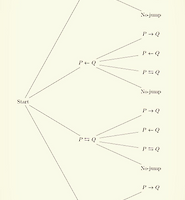| 일 | 월 | 화 | 수 | 목 | 금 | 토 |
|---|---|---|---|---|---|---|
| 1 | 2 | 3 | 4 | 5 | ||
| 6 | 7 | 8 | 9 | 10 | 11 | 12 |
| 13 | 14 | 15 | 16 | 17 | 18 | 19 |
| 20 | 21 | 22 | 23 | 24 | 25 | 26 |
| 27 | 28 | 29 | 30 |
- 적분
- Order
- a-level
- division
- 바이어슈트라스
- algebraic
- Weierstrass
- 영국
- solution
- DENOMINATOR
- test
- 치환
- factor
- Oxford
- triangle
- fractions
- integral
- 학년
- equation
- factors
- t-치환
- GCSE
- Admissions
- College
- 제도
- Partial
- 교육
- Maths
- mathematics
- differential
- Today
- Total
Cambridge Maths Academy
4. A question on logarithms (Eton College 01C_MT1 Q16) 본문
4. A question on logarithms (Eton College 01C_MT1 Q16)
Cambridge Maths Academy 2020. 12. 9. 03:41
수학 모음 (Maths collection) 전체보기
This question comes from a test paper for A-level maths for Michaelmas Term at Eton College.
Q16. (a) Solve the equation $$ \begin{align} \log_{10}\left(3^x-5^{2-x}\right)=2+\log_{10}(2)-x\log_{10}(5), \end{align} $$ giving your answer as exact. [3 marks]
(b) Solve the equation $$ \begin{align} \left(5\sqrt{5}\right)^{3x}-31=30\left(\frac1{\sqrt[4]{5}}\right)^{9x}, \end{align} $$ giving your answer correct to 3 significant figures. [4 marks]
Solution. (a) We find $$ \begin{align} \log_{10}\left(3^x-5^{2-x}\right)&=2+\log_{10}(2)-x\log_{10}(5) \\ &=\log_{10}\left(10^2\right)+\log_{10}(2)-\log_{10}\left(5^x\right) \\ &=\log_{10}\left(\frac{200}{5^x}\right) \end{align} $$ Since logarithm is a one-to-one function, this gives $$ \begin{align} \Rightarrow\quad 3^x-5^{2-x}&=\frac{200}{5^x} \\ \Rightarrow\quad 3^x-\frac{25}{5^x}&=\frac{200}{5^x} \\ \Rightarrow\quad 3^x\times 5^x-25&=200 \\ \Rightarrow\quad 15^x&=225 \\ \\ \Rightarrow\quad x&=\log_{15}(225) \\ &=\log_{15}\left(15^2\right) \\ &=2 \end{align} $$
(b) We have $$ \begin{align} \left(5\sqrt{5}\right)^{3x}-31&=30\left(\frac1{\sqrt[4]{5}}\right)^{9x} \\ \Rightarrow\quad \left(5^{\frac32}\right)^{3x}-31&=30\left(5^{-\frac14}\right)^{9x} \\ \Rightarrow\quad 5^{\frac{9x}{2}}-31&=30\left({5^{-\frac{9x}{4}}}\right) \end{align} $$ We let $t=5^{\frac{9x}{4}}$, then the equation reads $$ \begin{align} t^2-31&=\frac{30}{t} \\ \Rightarrow\quad f(t)=t^3-31t-30&=0 \end{align} $$ We note that $f(-1)=0$ and, by the factor theorem, $(t+1)$ is a factor, i.e. $$ \begin{align} f(t)&=(t+1)\left(t^2-t-30\right) \\ &=(t+1)(t+5)(t-6) \\ \\ \Rightarrow\quad t&=-1,\quad -5,\quad 6 \end{align} $$ Since $t=5^{\frac{9x}{4}}>0$ for real values $x$, only $t=6$ gives a real solution for $x$. $$ \begin{align} t=5^{\frac{9x}{4}}&=6 \\ \Rightarrow\quad \frac{9x}{4}&=\log_5(6) \\ \Rightarrow\quad x&=\frac49\log_5(6)=0.495\quad{\rm (3\;s.f.)} \end{align} $$
'수학 모음 (Maths collection) > Technical B - Problem solving' 카테고리의 다른 글
| 6. Probability - Jumping goldfish (GCSE) (0) | 2020.12.29 |
|---|---|
| 5. A counting problem - Lucy & Anton in the photo (GCSE) (0) | 2020.12.29 |
| 3. A question on trigonometry (Eton College 01C_MT1 Q15) (0) | 2020.12.09 |
| 2. A question on exponential decay (Eton College 01C_MT1 Q14) (0) | 2020.12.09 |
| 1. 헤론의 공식 유도 (A derivation of Heron's formula) (0) | 2020.06.22 |

